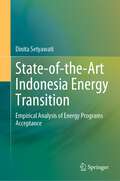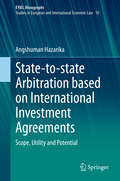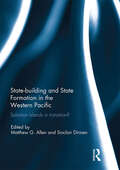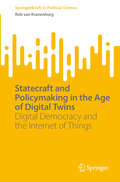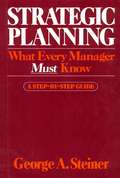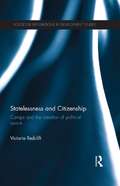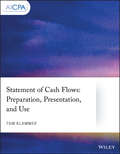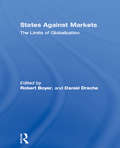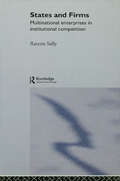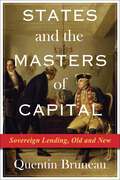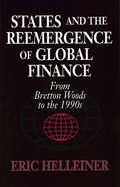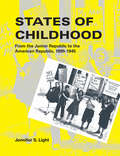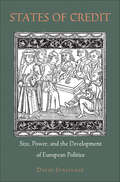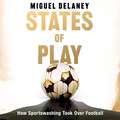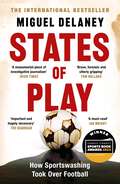- Table View
- List View
State-of-the-Art Indonesia Energy Transition: Empirical Analysis of Energy Programs Acceptance
by Dinita SetyawatiThis book discusses how people can come together to address current energy justice and access poverty problems by examining the relationship between energy systems and society in diverse energy sources. The novelty of this book is that this is the only complete guide for readers who wish to understand the status of Indonesia’s energy transition and renewable energy development. Energy programs that are explored are the ones prioritized by government administrations, including coal, nuclear power, solar energy, green electricity, and geothermal energy. Based on extensive fieldwork and empirical data, the book combines insights from historical data on energy subsidies and economic diversification, current empirical data on social acceptance of new energy technologies, and contemporary studies that forecast the implications of the transition to the coal industry and fossil fuel subsidies. It asks how Indonesia has enacted policies that support energy transition. How do the public and civil society view those policies? What are the implications for broader themes and discussions on energy sources, technology, systems, policies, and service? Strategies are suggested to advance a sustainable transition in the developing world that will mitigate developmental risks associated with the transition away from fossil fuels while encouraging decision making in a sustainable and socially just manner. This book is an informative and engaging read for a general audience as well as a valuable resource for scholars, researchers, and students in environmental and energy studies.
State-to-state Arbitration based on International Investment Agreements: Scope, Utility and Potential (European Yearbook of International Economic Law #10)
by Angshuman HazarikaThis book discusses the use of the compromissory clause in international investment agreements (IIAs) for interstate dispute resolution. It puts forward the possibility of using state-to-state arbitration based on the compromissory clause in IIAs as an alternative means of resolving investment disputes in light of the global debate on the shortcomings of investor-state arbitration. The book’s main conclusion is that state-to-state arbitration may be used as an alternative to currently popular investor-state arbitration by resolving procedural hurdles which impede its acceptance. It becomes more important with the removal of investor-state arbitration as an option in certain recent IIAs, which then elevates state-to-state arbitration as the sole option for binding third party dispute resolution in the treaty. Even then, it is unlikely to replace investor-state arbitration completely due to its inherent shortcomings, such as the risk of re-politicising disputes and a lack of direct control over the process for the affected investors. Nevertheless, the availability of an alternative forum will benefit all parties involved, as they will no longer be wholly dependent on investor-state arbitration, which can be affected by events such as denunciation from the ICSID Convention or the refusal of a host state to enforce an arbitration award.
Statebuilding and State Formation in the Western Pacific: Solomon Islands in Transition?
by Matthew G. Allen Sinclair DinnenThis book provides a rigorous and cross-disciplinary analysis of this Melanesian nation at a critical juncture in its post-colonial and post-conflict history, with contributions from leading scholars of Solomon Islands. The notion of ‘transition’ as used to describe the recent drawdown of the decade-long Regional Assistance Mission to Solomon Islands (RAMSI) provides a departure point for considering other transformations – social, political and economic –under way in the archipelagic nation. Organised around a central tension between change and continuity, two of the book’s key themes are the contested narratives of changing state–society relations and the changing social relations around land and natural resources engendered by ongoing processes of globalisation and urbanisation. Drawing heuristically on RAMSI’s genesis in the ‘state- building moment’ that dominated international relations during the first decade of this century, the book also examines the critical distinction between ‘state-building’ and ‘state formation’ in the Solomon Islands context. It engages with global scholarly and policy debates on issues such as peacebuilding, state-building, legal pluralism, hybrid governance, globalisation, urbanisation and the governance of natural resources. These themes resonate well beyond Solomon Islands and Melanesia, and the book will be of interest to a wide range of students, scholars and development practitioners. This book was previously published as a special issue of The Journal of Pacific History.
Statecraft and Policymaking in the Age of Digital Twins: Digital Democracy and the Internet of Things (SpringerBriefs in Political Science)
by Rob van KranenburgThis book describes the transition from basic automation to pervasive computing, ubiquitous computing, ambient intelligence, and the Internet of Things, and its effects on democratic decision-making and governance in Europe. It diagnoses a lack of political agency and technical capabilities in the West that has accelerated the end of the model of entrepreneurial government in favor of a new paradigm: Cyber-physical Systems. Offering an analysis of the digital transformation process in various industries and institutions, the book highlights the severe repercussions and impacts on democratic decision-making and the legitimacy of the Westphalian model of the nation-state. Readers will learn how the convergence of cloud systems, data platforms, and connected objects is facilitating this transformation process, one characterized by a virtual representation of every person, object, and machine – a digital twin. The book argues for balancing centralization and decentralization in a cybernetic framework with human-centric values at its core. Further, it proposes a political framework that aims to develop a next-generation internet for the five hundred million citizens of Europe, one capable of enforcing and promoting digital hegemony while safeguarding the rights and proactive capabilities of said citizens. In closing, the book makes the case for a (6G) phone/hardware wallet built on European chip requirements and platforms and running on its own OS to promote technical European integration on infrastructure, applications, and services. Given its scope, the book will appeal to policymakers and practitioners interested in European digital governance and autonomy, as well as scholars of public administration, public policy, and political science.
Statecraft: The Modern State in China and India
by Tarun KhannaThis chapter examines the evolution of the Chinese and Indian governments over the last half-century and the political legacies each country struggles with as it opens up to the twenty-first century.
Stated Choice Methods: Analysis and Applications
by David A. Hensher Jordan J. Louviere Joffre D. SwaitUnderstanding and predicting the behaviour of decision makers when choosing among discrete goods has been one of the most fruitful areas of applied research over the last thirty years. An understanding of individual consumer behaviour can lead to significant changes in product or service design, pricing strategy, distribution channel and communication strategy selection, as well as public welfare analysis. This graduate and practitioner guide, first published in 2000, deals with the study and prediction of consumer choice behaviour, concentrating on stated preference (SP) methods - placing decision makers in controlled experiments that yield hypothetical choices - rather than revealed preferences (RP) - actual choices in the market. It shows how SP methods can be implemented, from experimental design to econometric modelling, and suggests how to combine RP and SP data to get the best from each type. The book also presents an update of econometric approaches to choice modelling.
Stategic Planning
by George A. SteinerIn today's complex world of business, strategic planning is indispensable to effective management. Ever since the mid-1950's, when American companies began to develop formal long-range planning systems, wise managers have understood the importance of knowing where their firm was headed and how it intended to get there. To function effectively in a modern, planned operation, every manager must have a practical understanding of how the planning process works. That's exactly what this book offers: a step-by-step guide to strategic planning. George A. Steiner, a well-known expert in the field of management, provides a concise, jargon-free handbook that avoids abstract theory and takes you straight to the "how-to" of planning. Whether you're designing and implementing a new plan or working with a plan that's already in operation, Strategic Planning puts the information you need at your fingertips. It takes you through every stage of the process, from idea to execution to evaluation. (And explains "Fifty Common Pitfalls" you'll need to know about.) You can plug your own data into the lucid charts, tables, and checklists for a valuable start on getting organized and evaluating your planning needs. And there's plenty of penetrating discussion about the questions and quandaries you're likely to meet along the way. For example: * How do you identify, evaluate, and implement strategies? * How do you design a planning system to fit the unique characteristics of you and your company? * Can an intuitive manager do formal strategic planning? * What are some ways to develop clear objectives? * What human behavior factors can endanger planning and how can managers overcome them? * How, and when, should a situation audit be made? * What do you need to know about computer models? * How can business planning lessons be applied to not-for-profit organizations? * How can managers apply lessons of planning experience to the planning of their own careers? You don't have to get an advanced degree to make strategic planning a part of your management style. All you need is the expert advice in this idea-packed handbook. (As a bonus the book includes a glossary of the terms, tools, and techniques of strategic planning.)
Stateless Commerce: The Diamond Network and the Persistence of Relational Exchange
by Barak D. RichmanHow does Manhattan’s 47th Street diamond district thrive as an ethnic marketplace without lawyers, courts, and state coercion? Barak Richman draws on insider interviews to show why relational exchange based on familiarity, trust, and community enforcement succeeds and what it reveals about the modern state’s limitations in governing the economy.
Statelessness and Citizenship: Camps and the Creation of Political Space (Routledge Explorations in Development Studies)
by Victoria RedcliftWhat does it mean to be a citizen? In depth research with a stateless population in Bangladesh has revealed that, despite liberal theory’s reductive vision, the limits of political community are not set in stone. The Urdu-speaking population in Bangladesh exemplify some of the key problems facing uprooted populations and their experience provides insights into the long term unintended consequences of major historical events. Set in a site of camp and non-camp based displacement, it illustrates the nuances of political identity and lived spaces of statelessness that Western political theory has too long hidden from view. Using Bangladesh as a case study, Statelessness and Citizenship: Camps and the creation of political space argues that the crude binary oppositions of statelessness and citizenship are no longer relevant. Access to and understandings of citizenship are not just jurally but socially, spatially and temporally produced. Unpicking Agamben’s distinction between ‘political beings’ and ‘bare life’, the book considers experiences of citizenship through the camp as a social form. The camps of Bangladesh do not function as bounded physical or conceptual spaces in which denationalized groups are altogether divorced from the polity. Instead, citizenship is claimed at the level of everyday life, as the moments in which formal status is transgressed. Moreover, once in possession of ‘formal status’ internal borders within the nation-state render ‘rights-bearing citizens’ effectively ‘stateless’, and the experience of ‘citizens’ is very often equally uneven. While ‘statelessness’ may function as a cold instrument of exclusion, certainly, it is neither fixed nor static; just as citizenship is neither as stable nor benign as the dichotomy would suggest. Using these insights, the book develops the concept of ‘political space’ – an analysis of the way history and space inform the identities and political subjectivity available to people. In doing so, it provides an analytic approach of relevance to wider problems of displacement, citizenship and ethnic relations.Shortlisted for this year’s BSA Philip Abrams Memorial Prize.
Statement of Cash Flows
by Jacob Cohen David F. HawkinsDiscusses the components of the statement of cash flow and its direct and indirect format of presentation. Also briefly explains the difference between cash and accrual accounting and provides examples of Standard Microsystems Corp. and Intel Corp.
Statement of Cash Flows: Preparation, Presentation, and Use (Aicpa Ser.)
by Tom KlammerStatement of Cash Flows: Preparation, Presentation, and Use by Tom Klammer
Statements of Cash Flows: Three Examples
by William J. Bruns Jr. Julie H. HertensteinThis case introduces the statement of cash flow through three examples of multi-year statements of cash flows from three unidentified companies.
Statements of Cash Flows: Three Examples
by William J. Bruns Jr. Julie H. HertensteinThis case introduces the statement of cash flow through three examples of multi-year statements of cash flows from three unidentified companies.
States Against Markets: The Limits of Globalization (Routledge Studies in Governance and Change in the Global Era)
by Daniel Drache Robert BoyerThis work challenges the popular view that globalization threatens the role of the nation-state in determining national policy. It examines the fundamental issue of competitiveness and market power in an increasingly borderless and co-dependent world. Despite this increased threat to the nation-state as an effective manager of the national economy, the authors argue that there are a number of options and alternatives open to governments to protect themselves from the global business cycle.
States and Firms: Multinational Enterprises in Institutional Competition (Routledge Studies in International Business and the World Economy #1)
by Razeen SallyFirst published in 1995. Routledge is an imprint of Taylor & Francis, an informa company.
States and Markets in Hydrocarbon Sectors
by Andrei V. Belyi Kim TalusResearch on the role of states and markets in the hydrocarbon sector is highly topical in contemporary International Political Economy. This edited collection will approach this subject from a broader perspective, investigating the very essence of the interaction between the state and the market and how this varies on a regional basis.
States and the Masters of Capital: Sovereign Lending, Old and New (Columbia Studies in International Order and Politics)
by Quentin BruneauToday, states’ ability to borrow private capital depends on stringent evaluations of their creditworthiness. While many presume that this has long been the case, Quentin Bruneau argues that it is a surprisingly recent phenomenon—the outcome of a pivotal shift in the social composition of financial markets.Investigating the financiers involved in lending capital to sovereigns over the past two centuries, Bruneau identifies profound changes in their identities, goals, and forms of knowledge. He shows how an old world made up of merchant banking families pursuing both profit and status gradually gave way to a new one dominated by large companies, such as joint stock banks and credit rating agencies, exclusively pursuing profit. Lacking the web of personal ties to sovereigns across the world that their established rivals possessed, these financial institutions began relying on a different form of knowledge created to describe and compare states through quantifiable data: statistics. Over the course of this epochal shift, which only came to an end a few decades ago, financial markets thus reconceptualized states. Instead of a set of individuals to be known in person, they became numbers on a page. Raising new questions about the history of sovereign lending, this book illuminates the nature of the relationship between states and financial markets today—and suggests that it may be on the cusp of another major transformation.
States and the Reemergence of Global Finance: From Bretton Woods to the 1990s
by Eric HelleinerMost accounts explain the postwar globalization of financial markets as a product of unstoppable technological and market forces. Drawing on extensive historical research, Eric Helleiner provides the first comprehensive political history of the phenomenon, one that details and explains the central role played by states in permitting and encouraging financial globalization. Helleiner begins by highlighting the commitment of advanced industrial states to a restrictive international financial order at the 1944 Bretton Woods conference and during the early postwar years. He then explains the growing political support for the globalization of financial markets after the late 1950s by analyzing five sets of episodes: the creation of the Euromarket in the 1960s, the rejection in the early 1970s of proposals to reregulate global financial markets, four aborted initiatives in the late 1970s and early 1980s to implement effective controls on financial movements, the extensive liberalization of capital controls in the 1980s, and the containment of international financial crises at three critical junctures in the 1970s and 1980s. He shows that these developments resulted from various factors, including the unique hegemonic interests of the United States and Britain in finance, a competitive deregulation dynamic, ideological shifts, and the construction of a crisis-prevention regime among leading central bankers. In his conclusion Helleiner addresses the question of why states have increasingly embraced an open, liberal international financial order in an era of considerable trade protectionism.
States in the Developing World
by Atul Kohli Deborah J. Yashar Miguel Centeno Dinsha MistreeWhat should states in the developing world do and how should they do it? How have states in the developing world addressed the challenges of promoting development, order, and inclusion? States in the developing world are supposed to build economies, control violence, and include the population. How they do so depends on historical origins and context as well as policy decisions. This volume presents a comprehensive theory of state capacity, what it consists of, and how it may be measured. With historical empirical illustrations it suggests that historical origins and political decisions help drive the capacity of states to meet their goals.
States of Childhood: From the Junior Republic to the American Republic, 1895-1945
by Jennifer S. LightHow "virtual adulthood"--children's role play in simulated cities, states, and nations--helped construct a new kind of "sheltered" childhood for American young people.A number of curious communities sprang up across the United States in the late nineteenth and early twentieth century: simulated cities, states, and nations in which children played the roles of legislators, police officers, bankers, journalists, shopkeepers, and other adults. They performed real work--passing laws, growing food, and constructing buildings, among other tasks--inside virtual worlds. In this book, Jennifer Light examines the phenomena of "junior republics" and argues that they marked the transition to a new kind of "sheltered" childhood for American youth. Banished from the labor force and public life, children inhabited worlds that mirrored the one they had left.
States of Credit: Size, Power, and the Development of European Polities (The Princeton Economic History of the Western World #35)
by David StasavageStates of Credit provides the first comprehensive look at the joint development of representative assemblies and public borrowing in Europe during the medieval and early modern eras. In this pioneering book, David Stasavage argues that unique advances in political representation allowed certain European states to gain early and advantageous access to credit, but the emergence of an active form of political representation itself depended on two underlying factors: compact geography and a strong mercantile presence. Stasavage shows that active representative assemblies were more likely to be sustained in geographically small polities. These assemblies, dominated by mercantile groups that lent to governments, were in turn more likely to preserve access to credit. Given these conditions, smaller European city-states, such as Genoa and Cologne, had an advantage over larger territorial states, including France and Castile, because mercantile elites structured political institutions in order to effectively monitor public credit. While creditor oversight of public funds became an asset for city-states in need of finance, Stasavage suggests that the long-run implications were more ambiguous. City-states with the best access to credit often had the most closed and oligarchic systems of representation, hindering their ability to accept new economic innovations. This eventually transformed certain city-states from economic dynamos into rentier republics. Exploring the links between representation and debt in medieval and early modern Europe, States of Credit contributes to broad debates about state formation and Europe's economic rise.
States of Obligation
by Yanni KotsonisBeginning in the 1860s, the Russian Empire replaced a poll tax system that originated with Peter the Great with a modern system of income and excise taxes. Russia began a transformation of state fiscal power that was also underway across Western Europe and North America. States of Obligation is the first sustained study of the Russian taxation system, the first to study its European and transatlantic context, and the first to expose the essential continuities between the fiscal practices of the Russian Empire and the Soviet Union.Using a wealth of materials from provincial and local archives across Russia, Yanni Kotsonis examines how taxation was simultaneously a revenue-raising and a state-building tool, a claim on the person and a way to produce a new kind of citizenship. During successive political, wartime, and revolutionary crises between 1855 and 1928, state fiscal power was used to forge social and financial unity and fairness and a direct relationship with individual Russians. State power eventually overwhelmed both the private sector economy and the fragile realm of personal privacy. States of Obligation is at once a study in Russian economic history and a reflection on the modern state and the modern citizen.
States of Play: How Sportswashing Took Over Football
by Miguel Delaney'A must-read on how modern football works.' - Ian Wright'In this excellent investigation, Delaney reveals the ugly side of the beautiful game.' - Oliver Bullough'Brave, forensic and utterly gripping.' - Tom Holland'Majestic... the essential guide to how the people's game has become the plaything of the very rich and powerful.' - Jonathan Wilson______________________________The definitive account of how capitalism and the world's elite corrupted modern footballAs the 2022 World Cup in Qatar drew to a close, there was a bitter undercurrent to Argentina's triumph. Throughout the tournament, numerous allegations of sportswashing and financial misconduct had been made against the state of Qatar, moving what had previously been a smaller conversation into the worldwide spotlight. The question had been asked, who really owns and runs football? Journeying from Abu Dhabi to Newcastle, and onto London, Paris, Moscow and New York, journalist Miguel Delaney investigates the allegations of sportswashing and misconduct in the beautiful game. The result is a gripping account of how football has been taken over by the world's wealthiest businessmen, state-backed corporations, media tycoons and oil-rich oligarchs. From Neymar's £198 million transfer to Paris Saint-Germain and Abu Dhabi's construction empire in Manchester to failed Financial Fair Play constraints and the dawn of the European Super League, Miguel draws on exclusive interviews and unprecedented access to key stakeholders to produce an all-encompassing exposé of modern footballs highest echelons.Authoritative, riveting and eye-opening, States of Play reveals how football has become a tool for the world's elite.______________________________'Delaney's diligence and determination to hold authorities to account is the moral compass that the game needs.' - Andy Brassell'The most important football book of its generation.' - Jack Pitt-Brooke'An eye-opening and essential investigation into the forces shaping the world's most popular sport.' - Joshua Robinson & Jonathan Clegg'This book tackles the major issue affecting football today with fearlessness and forensic scrutiny. An important investigation for our times.' - Laurie Whitwell
States of Play: How Sportswashing Took Over Football | The International Bestseller & Winner of the Football Book of the Year Award
by Miguel DelaneyTHE INTERNATIONAL BESTSELLER & WINNER OF THE FOOTBALL BOOK OF THE YEAR AWARDA TIMES SPORTS BOOK OF THE YEARA TELEGRAPH BOOK OF THE YEARAN IRISH TIMES BOOK OF THE YEARAN IRISH INDEPENDENT BOOK OF THE YEAR'Important, perfectly timed and hugely necessary.' The Guardian'A monumental piece of investigative journalism.' Irish Times'A must-read on how modern football works.' Ian Wright'Brave, forensic and utterly gripping.' Tom Holland______________________________The definitive account of how capitalism and the world's elite corrupted modern football. Fully updated to cover Saudi Arabia's 2034 World Cup bid, the Manchester City charges case and PSG winning the Champions League.As the 2022 World Cup in Qatar drew to a close, there was a bitter undercurrent to Argentina's triumph. Throughout the tournament, numerous allegations of sportswashing and financial misconduct had been made against the state of Qatar, moving what had previously been a smaller conversation into the worldwide spotlight.The question had been asked, who really owns and runs football?Journeying from Abu Dhabi to Newcastle, and onto London, Paris, Moscow and New York, journalist Miguel Delaney investigates the allegations of sportswashing and misconduct in the beautiful game. The result is a gripping account of how football has been taken over by the world's wealthiest businessmen, state-backed corporations, media tycoons and oil-rich oligarchs.From Neymar's £198 million transfer to Paris Saint-Germain and Abu Dhabi's construction empire in Manchester to failed Financial Fair Play constraints and the dawn of the European Super League, Miguel draws on exclusive interviews and unprecedented access to key stakeholders to produce an all-encompassing exposé of modern footballs highest echelons.Authoritative, riveting and eye-opening, States of Play reveals how football has become a tool for the world's elite.______________________________Miguel Delaney's STATES OF PLAY was ranked in the Irish Times bestsellers list the weeks of 11th-18th November & 9th December 2024.
States of Play: How Sportswashing Took Over Football | The International Bestseller & Winner of the Football Book of the Year Award
by Miguel DelaneyTHE INTERNATIONAL BESTSELLER & WINNER OF THE FOOTBALL BOOK OF THE YEAR AWARDA TIMES SPORTS BOOK OF THE YEARA TELEGRAPH BOOK OF THE YEARAN IRISH TIMES BOOK OF THE YEARAN IRISH INDEPENDENT BOOK OF THE YEAR'Important, perfectly timed and hugely necessary.' The Guardian'A monumental piece of investigative journalism.' Irish Times'A must-read on how modern football works.' Ian Wright'Brave, forensic and utterly gripping.' Tom Holland______________________________The definitive account of how capitalism and the world's elite corrupted modern football. Fully updated to cover Saudi Arabia's 2034 World Cup bid, the Manchester City charges case and PSG winning the Champions League.As the 2022 World Cup in Qatar drew to a close, there was a bitter undercurrent to Argentina's triumph. Throughout the tournament, numerous allegations of sportswashing and financial misconduct had been made against the state of Qatar, moving what had previously been a smaller conversation into the worldwide spotlight.The question had been asked, who really owns and runs football?Journeying from Abu Dhabi to Newcastle, and onto London, Paris, Moscow and New York, journalist Miguel Delaney investigates the allegations of sportswashing and misconduct in the beautiful game. The result is a gripping account of how football has been taken over by the world's wealthiest businessmen, state-backed corporations, media tycoons and oil-rich oligarchs.From Neymar's £198 million transfer to Paris Saint-Germain and Abu Dhabi's construction empire in Manchester to failed Financial Fair Play constraints and the dawn of the European Super League, Miguel draws on exclusive interviews and unprecedented access to key stakeholders to produce an all-encompassing exposé of modern footballs highest echelons.Authoritative, riveting and eye-opening, States of Play reveals how football has become a tool for the world's elite.______________________________Miguel Delaney's STATES OF PLAY was ranked in the Irish Times bestsellers list the weeks of 11th-18th November & 9th December 2024.
